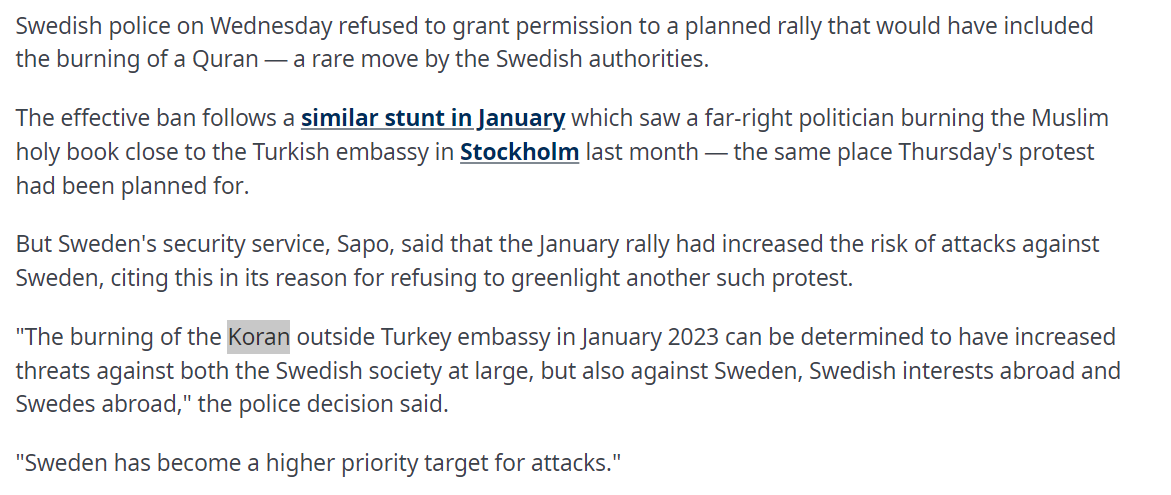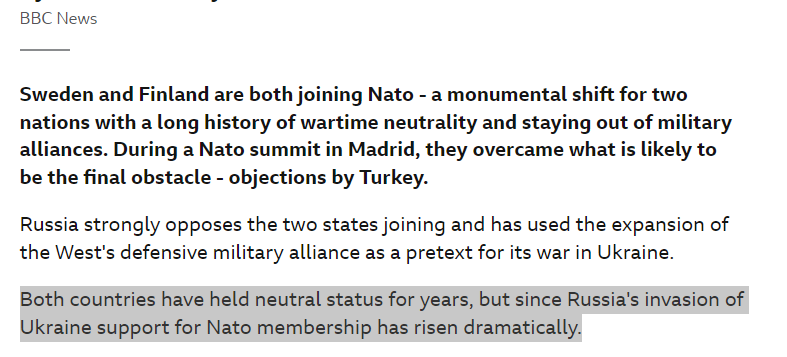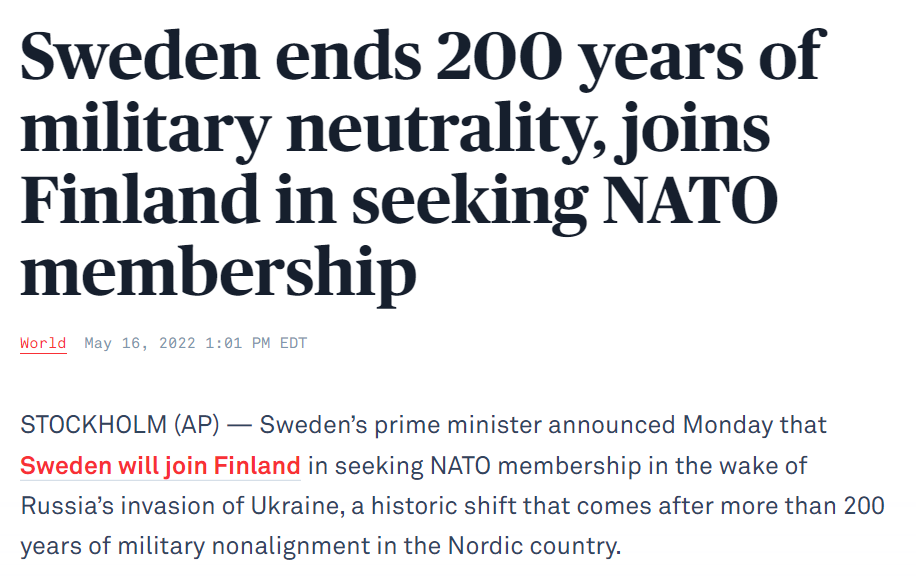General Discussion
Related: Editorials & Other Articles, Issue Forums, Alliance Forums, Region ForumsKey Points: Five things you need to know about Sweden and Nato
After decades of staying out of military alliances, Finland and neighbouring Sweden announced bids to join Nato in the wake of Russia's invasion of Ukraine last year. Here are five things to know about the two countries' membership bids. After Turkey became the final member to ratify Finland’s bid on Thursday, the Finns are expected to finalise their membership in the coming days, while Sweden continues to face opposition.https://www.thelocal.se/20230331/key-points-five-things-you-need-to-know-about-sweden-joining-nato/
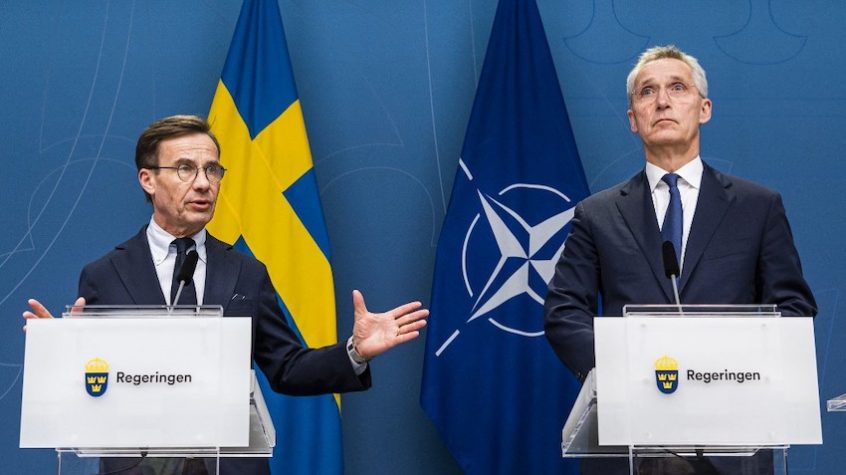
Nato Secretary General Jens Stoltenberg (R) and Swedish Prime Minister Ulf Kristersson address a joint press conference in Stockholm on March 7, 2023.
Historic U-turns
For decades, most Swedes and Finns were in favour of maintaining their policies of military non-alignment. But Russia’s invasion of Ukraine last year sparked sharp U-turns. The change was especially dramatic in Finland, which shares a 1,300-kilometre (800-mile) border with Russia. Prior to the application, public support for NATO membership had remained steady at 20-30 percent for two decades, but a February poll suggested 82 percent were happy with the decision to join the alliance. A Swedish poll in January had 63 percent of Swedes in favour of joining the bloc. During the Cold War, Finland remained neutral in exchange for assurances from Moscow that it would not invade. After the fall of the Iron Curtain, Finland remained militarily non-aligned. Sweden adopted an official policy of neutrality at the end of the 19th-century Napoleonic wars, which was amended to one of military non-alignment following the end of the Cold War.
Split entry
The Nordic neighbours were originally adamant they wanted to join the alliance together, agreeing to submit their applications at the same time. Despite assurances they would be welcomed with “open arms”, their applications quickly ran into opposition, primarily from NATO member Turkey. Bids to join NATO must be ratified by all members of the alliance. Turkish President Recep Tayyip Erdogan in mid-March asked parliament to ratify Finland’s bid, but delayed Sweden’s following a litany of disputes. Similarly, when Hungary ratified Finland’s bid on March 27, Sweden’s was pushed until “later”. Finland decided to move forward, even if it meant leaving Sweden behind. Since Finland’s parliament has already approved the application, all it needs to do now that all ratifications have been secured is deposit an “instrument of accession” in Washington to finalise the membership.
Sweden vs Turkey
Sweden, Finland and Turkey signed a trilateral memorandum at a NATO summit in June last year to secure the start of the accession process. But Ankara has repeatedly butted heads with Stockholm, saying its demands have remained unfulfilled, particularly for the extradition of Turkish citizens that Turkey wants to prosecute for “terrorism”. It has accused Sweden of providing a safe haven for “terrorists”, specifically members of the Kurdistan Workers’ Party (PKK). Negotiations between the countries were temporarily suspended in early 2023, after protests — involving both the burning of the Koran and a mock hanging of an effigy of Erdogan — were staged in Stockholm.
Militaries
Swedish policy long dictated that the country needed a strong military to protect its neutrality. But after the Cold War, it drastically slashed defence spending, turning its military focus toward peacekeeping operations. Combining its different branches, the Swedish military can field some 50,000 soldiers, about half of whom are reservists. While Finland has similarly made defence cuts, it has maintained a much larger army than Sweden. The country of 5.5 million people has a wartime strength of 280,000 troops plus 600,000 reservists. After Russia invaded Ukraine, both countries announced increased spending. Sweden said it was targeting two percent of GDP “as soon as possible”, and Finland added more than two billion euros ($2.1 billion) to its 5.1 billion-euro defence budget over the next four years.
snip
related
Nato chief calls for ‘rapid conclusion’ of Sweden’s Nato ratification
Nato chief Jens Stoltenberg called for a 'rapid conclusion' of Sweden's stalled Nato ratification process, as he said that on Friday that Finland would formally become a member of the defence alliance within days.
https://www.thelocal.se/20230331/nato-chief-calls-for-rapid-conclusion-of-swedens-nato-ratification/
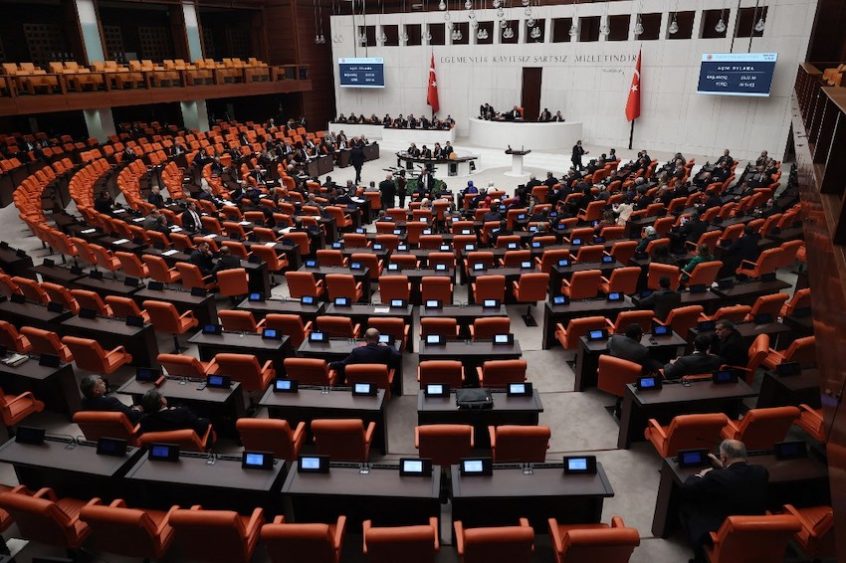
The Turkish Parliament vote to approve Finland's application to join NATO, with 276 votes, in Ankara, on March 30, 2023.
“I look forward to raising Finland’s flag at Nato HQ in the coming days. Together we are stronger and safer,” Stoltenberg wrote on Twitter. After months of delays, Turkey’s parliament on Thursday removed the last hurdle for Finland by becoming the last member of the US-led military alliance to ratify its application.
Stoltenberg said in separate statement that “Finland has highly capable forces, advanced capabilities, and strong democratic institutions”. “So Finland will bring a lot to our alliance,” he said.
Nato foreign ministers are meeting at the alliance’s headquarters in Brussels next week, when it is expected the membership could be formalised. Russia’s invasion of Ukraine last year upended European security and pushed Finland and its neighbour Sweden to drop decades of non-alignment and seek to join Nato’s protective umbrella.
Stockholm application remains stuck, however, because of ongoing resistance from both Turkey and Hungary. But Stoltenberg insisted that “all allies agree that a rapid conclusion of the ratification process for Sweden will be in everyone’s interest”. “I look forward to also welcoming Sweden as a full member of the Nato family as soon as possible,” he said.
snip
Drum
(10,601 posts)Wounded Bear
(63,993 posts)Just A Box Of Rain
(5,104 posts)While Sweden (and Finland) have not been formal members of NATO, suggesting that they have had "policies of military non-alignment" is an over-statement.
Both nations have conducted regular military exercises with NATO countries, share and have co-develop weapons systems with NATO countries, and share communications and command and control systems with NATO countries.
They have been aligned with NATO in all-but-name for a long time. Not in a formal way that would automatically triggered Article 5, but they have hardly been neutral.
The coverage of the dispute with Turkey would have been much more informative if it had included the a discussion of complicated role Amineh Kakabaveh, a former Kurdish (Iranian) guerilla fighter and until recently an independent leftist MP in what was an absolutely deadlocked parliament (with her holding the balance of power), whose role in parliament angered the Turks, and who wasn't particularly pro-NATO, played in the dispute.
The Local should also know that transliterating the Qur'an as "Koran" in English is archaic, out of conformance with contemporary transliteration schemes, and offensive to many.
Celerity
(54,005 posts)The indefinite articles, which are only used in the singular, are 'en' for common nouns, and 'ett' for neuter nouns. When the usage is definitive, then you use 'en' and 'et' at the end, respectively. It is far too complicated to get into what gender form to use here, as there is no set rule to define common versus neuter.

an aside,
mus also is one of many Swedish slang terms for a vagina, as is fitta
stock is slang for a penis, so many from outside of Stockholm call it cock town, or the cock islands (holm means small island in Swedish, lolol
Obviously Sweden and Finland formally joining Nato is huge deal, if it wasn't, Russia would not be wetting the bed.
More on the historical background:
https://academic.oup.com/book/44441/chapter/376663566
A Two-Hundred-Year Balancing Act
For over 200 years, there has been no war on Swedish soil. This unprecedented long period of peace coincides in time with the development of a policy of neutrality, up until the Swedish decision to apply for membership in NATO in 2022. According to a well-established narrative, Sweden’s policy of neutrality meant that Sweden should stay non-aligned with the intent to declaring itself neutral in the event of war. While Sweden has managed to stay out of war, Sweden has also have had to compromise with important principles in order to preserve the peace. The policy of neutrality has also often been situated in the tension between public declarations and secret collaboration. In this chapter, we add nuance to how this policy of neutrality was developed, and how it was implemented in flexible ways during changing circumstances. By doing so it is our aim to analyse in what ways the Swedish policy of neutrality can be considered to have been a success.
During the Cold War, the policy of neutrality made Swedish security policy predictable and from time to time gave it a credible position as an honest-broker mediator during various regional conflicts (Bjereld 1992). Nonetheless, centre-right politicians questioned the morality of the policy since Sweden refrained from outspoken criticism of the Soviet Union (Bjereld 1997). Even after the end of the Cold War Sweden refrained from joining military alliances and up until the decision in 2022 to apply for membership in NATO maintained a policy that has often been labelled ‘post-neutral’ in that it carried its basic stance into a new era (Möller and Bjereld 2015). As we will show, throughout its history the Swedish policy of neutrality has been based on a highly flexible interpretation of what it means to be neutral in terms of standpoints on the international stage. Sweden, especially after World War II, maintained a strict version of the policy in public, but was willing to compromise behind the scene in order to keep the policy in place and ultimately keep Sweden out of war, including courting defence cooperation with USA and NATO (cf. Dalsjö 2006; Harrisson 2017: 217–219; Holmström 2012).
The preconditions for Sweden’s flexible approach towards its policy of neutrality have been in place at least since 1834, with declarations of neutrality formulated and interpreted in ways that would maximize Sweden’s chances of staying out of conflicts. From the first steps during the first half of the 1800s the policy of neutrality was gradually institutionalized and remained in place up until 1995 and Swedish membership in the EU, but with ramifications for its security policy also after becoming a member of the EU. During this prolonged time the political conditions changed, external threats evolved, and Sweden established a representative democracy, but Sweden maintained its policy of neutrality in one form or another, with ramifications up until 2022.
Just A Box Of Rain
(5,104 posts)Transliterating the Qur'an as Koran is archaic and it offends many, as it is akin to a deliberate spelling mistake.
Arabic has consonants that equate to "k" and to "q" (kaf and qaf) and Qur'an is written with a qaf not a kaf.
Writing the vowel as "o" is also a mistake, and one that encourages mispronunciation in English, where "u" does not.
On a finer point, "Koran" also leaves out the 'ayn equivalent which is a voiced pharyngeal fricative.
Modern transliteration schemes use Qur'an in English, and The Local is woefully behind the times, to the point where they deserve to be called out on this. It is offensive.
As to "neutrality." Sweden has not been "neutral" in recent times. Far from it. As I said earlier, they have been integrated to a high degree with NATO for a long time. Co-developing weapons systems. Engaging in coordinated military exercises and sharing strategic interests.
Sweden has not formally joined NATO yet, but suggesting that neutrality has been Sweden's stance is recent decades is completely false.
Response to Just A Box Of Rain (Reply #9)
Celerity This message was self-deleted by its author.
Celerity
(54,005 posts)and making contrived claims about offensiveness.
It shows a tendency to try to force things into your self-constructed lens despite a lack of knowledge about a non American culture.
You are far from the first American to do this, of course, including many who live here, unfortunately.
If you want to play American word/culture police games about our journos, our culture, our customs, and our linguistics ( whether Swedish or Swedish translated English) then be my guest.
Lycka till. You will need it.
As for us being formally neutral for over 200 years, of course we have been, as I already showed.
There have been hundreds (likely thousands or more) of articles just in the past year or so stating this as a basic, given fact. It is the vastly accepted opinion. Your's is an outlier.
Just A Box Of Rain
(5,104 posts)Swedish language newspaper. Right?
I'm quite familiar with the English language.
And, while I'm not the most gifted Arabist, I can also read and write basic Arabic. How about you?
The use of "Koran" as a mis-transliteration of Qur'an. It is archaic, it looks ignorant, and it's offensive.
The Local should do better on this front. It makes them look bad.
Talk about a "lack of knowledge about a non American culture." This is a textbook case.
Sweden has not been "neutral" in recent decades. What happened 200 years ago is beside the point.
It's not germane to the current reality, where Sweden has integrated their military posture with NATO, does war games with NATO, develops weapons systems with NATO, and the only element missing from the equation has been formally joining the NATO alliance. Which is in process.
Celerity
(54,005 posts)Our Swedish state security police, Säkerhetspolisen (SÄPO).
and notice the two spellings here, the German Deutsche Welle spells it Quran, BUT when quoting SÄPO, it is Koran
The Economist
The BBC
Radio France Internationale, state-owned French radio, using AFP (Agence France-Presse)
The Canberra Times (the main newspaper for the Australian capital)
Haaretz
France 24 , the state owned international news network
etc etc etc
Sweden as a neutral:
BBC
PBS
The New York Times
The Irish Times
Le Monde
Al Jazeera
Just A Box Of Rain
(5,104 posts)doesn't take the onus off The Local for doing the same.
Just like it's not okay for news outlets to misgender people just because one can Google bad examples.
As to Sweden. Not being in a formal alliance isn't the same thing as being "neutral."
As I said repeatedly, Sweden has conducted regular military exercises with NATO, uses and co-develops weapons systems with NATO countries, employs NATO standard command and control systems, and has strategic planning that's conducted with NATO countries.
The "conversion" to being in NATO will only be a formality. That formality will bring rights and responsibilities under the NATO charter that are important, but Sweden isn't "neutral" now. They are just outside the formal alliance.
I'm rather astonished that you are doubling down on any of this.
TeamProg
(6,630 posts)Duppers
(28,469 posts)And besides, I hate their double-standard treatment of women.
Mister Ed
(6,873 posts)Turkey's geographical location makes it a bulwark against Russian expansion, and gives it control of the straits through which Russian naval vessels based in the Black Sea must pass. Their expulsion from NATO would cripple the alliance without helping oppressed minorities and women in Turkey.
We're left hoping for (and cautiously supporting?) internal change in the country instead. A very difficult balancing act.
Duppers
(28,469 posts)But that'd result in removing your very informative reply. Thank you!
edhopper
(37,179 posts)Turkey and Hungary return to a non-fascist government at some point.
WarGamer
(18,332 posts)I thought that they were devoted to neutrality and just wanted to concentrate on their international banking??
PS... don't know much about Sweden but I did stay the night in Zurich once...
(inside joke with Celerity)



